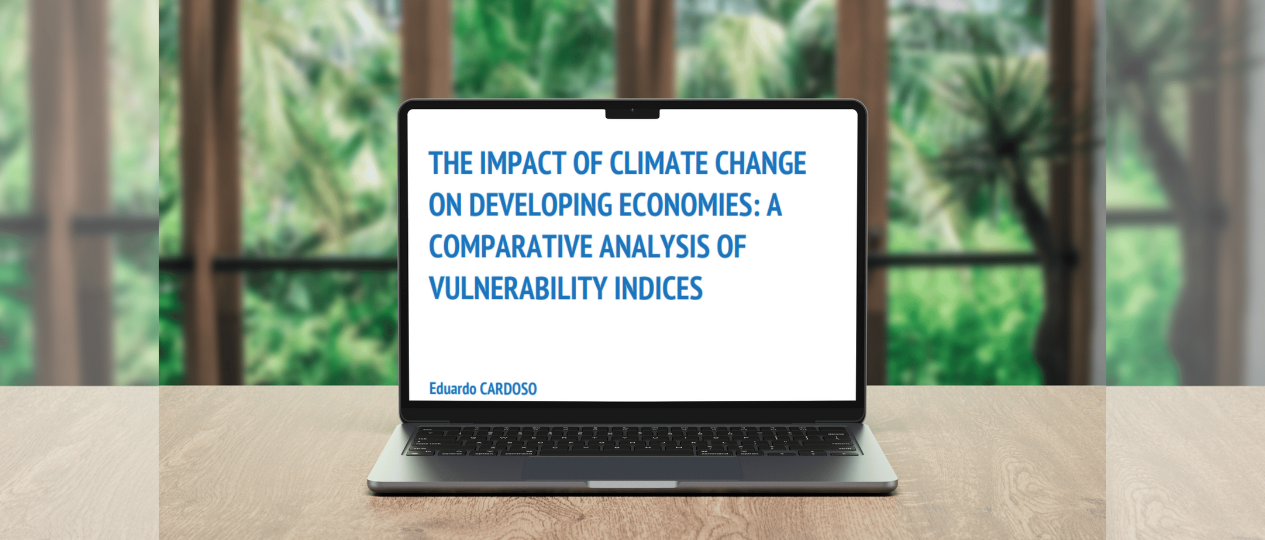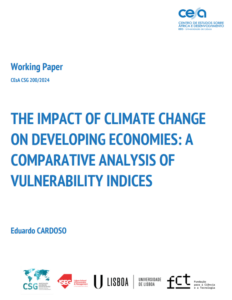CEsA Working Paper n. 200/2024 carries out a comparative analysis of key indices that classify countries’ vulnerability to climate change

CEsA has published the Working Paper no 200/2024, entitled “The Impact of Climate Change on Developing Economies: A comparative analysis of vulnerability indices”, in English, authored by Eduardo Cardoso, who holds a Master degree in International Economics and European Studies from the Lisbon School of Economics and Management (ISEG), Universidade de Lisboa. The main objective of this Working Paper is to analyse whether key indices in climate science consistently classify countries’ vulnerability to climate disruption.
The author reviews the literature on the impact of climate change in developing countries, followed by a comparative analysis of the EVI, ND-GAIN, INFORM, and WRI indices from 2014 to 2020. The findings indicate that the diversity in the components of vulnerability lead to divergent results. In conclusion, the author identifies the need for a holistic approach that results in vulnerability indices adapted to specific objectives and contexts.
Click here to access the Working Paper no 200/2024.
Abstract:
 In order to make informed decisions on climate finance and policies, there is an increasing need to develop an index to assess countries’ vulnerability to climate change. However, differing concepts and methodologies have led to varied views on which countries are most vulnerable and deserve more international financial support. This Working Paper examines whether key indices in climate science consistently classify countries’ vulnerability to climate disruption. It begins by reviewing literature on the impact of climate change on developing countries, followed by a comparative analysis of the EVI, ND-GAIN, INFORM, and WRI indices from 2014 to 2020. The findings indicate that while these indices are valuable for understanding and monitoring vulnerability, their differing components lead to divergent results. This research underscores the importance of a holistic approach to vulnerability assessment and calls for informed selection of indices based on specific objectives and contexts.
In order to make informed decisions on climate finance and policies, there is an increasing need to develop an index to assess countries’ vulnerability to climate change. However, differing concepts and methodologies have led to varied views on which countries are most vulnerable and deserve more international financial support. This Working Paper examines whether key indices in climate science consistently classify countries’ vulnerability to climate disruption. It begins by reviewing literature on the impact of climate change on developing countries, followed by a comparative analysis of the EVI, ND-GAIN, INFORM, and WRI indices from 2014 to 2020. The findings indicate that while these indices are valuable for understanding and monitoring vulnerability, their differing components lead to divergent results. This research underscores the importance of a holistic approach to vulnerability assessment and calls for informed selection of indices based on specific objectives and contexts.
About the author:
Eduardo Cardoso holds a Bachelor’s degree in Political Science from the University Institute of Lisbon (ISCTE) and a Master of Science in International Economics and European Studies from Lisbon School of Economics and Management (ISEG), Universidade de Lisboa.
Click here and get to know all the Working Paper Collection of CEsA
Author: CEsA Communications (comunicacao@cesa.iseg.ulisboa.pt)
Images: CEsA/Reproduction





